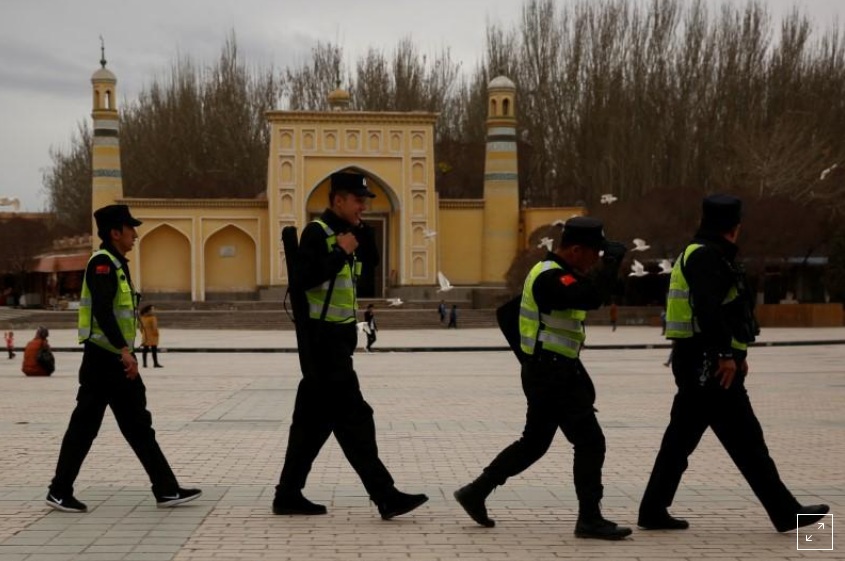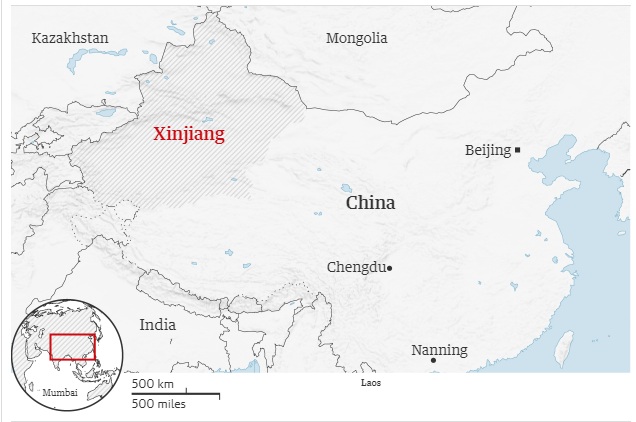
A police patrol walk in front of the Id Kah Mosque in the old city of Kashgar, Xinjiang Uighur Autonomous Region, China in 2017
Photo: Reuters
China has denied allegations raised by a United Nations panel on August 10 that it had over one million Uighur Muslims detained in its far western region of Xinjiang – or East Turkestan – and said it was only taking measures to maintain peace and stability in those parts.
A United Nations anti-discrimination committee raised concerns over China’s treatment of Uighurs based on reports of mass detention centres resembling “massive internment camps shrouded in secrecy”.Over one million of the ethnic Muslims are estimated to be in detention in “counter-extremism centres”, said Gay McDougall, vice chairperson of the committee citing the reports.
The Chinese foreign ministry responded on August 13, saying these allegations were “completely untrue” and that criticism of its policies was the work of “Anti-China forces“.
Uighurs are a Turkic ethnic group who live in east and central Asia and currently live primarily in the Xinjiang Uighur Autonomous Region of the People’s Republic of China where they are one of 55 officially recognised ethnic minorities. Like Tibetans, the people of Xinjiang live under Chinese rule and are denied religious freedom.
Over the last few months, there has been an increasing number of reports and sightings of Uighurs, even those not in the region, being summoned and sent into these camps or “re-education centres” where they are forced to denounce Islam and profess loyalty to the Communist party of China.
“The argument that one million Uighurs are detained in re-education centres is completely untrue,” Hu Lianhe, a senior Communist Party official told the UN, “For those who are convicted of minor offences, we help and teach them in vocational skills in education and training centres, according to relevant laws. There is no arbitrary detention and torture,” he noted.

Photo: The Guardian
The Chinese government explained that Islamist militants and separatists are trying to disrupt the peace in the region by stirring up tensions between the Uighur minority who reside there and the ethnic Han Chinese majority.It maintained that the current peace and stability in the region can be credited to its anti-terrorism measures and its decision to implement “intense regulations” there, adding that police and security posts have been set up all over the region.
The statement continued,“the Chinese government never links terrorism with any ethnic group or religion”, adding that only “those deceived by religious extremism … shall be assisted by resettlement and re-education”.
State run media stepped up to China’s defense, stating that it is because of the involvement of the government that Xinjiang has not turned into China’s equivalent of Syria or Libya.Tabloids and newspapers went on to say this criticism levied on the government’s actions was intended to disrupt peace and stir up trouble in the region.
These strict security measures were initiatedin response to the hundreds of deaths over the years as a result of violence in Xinjiang, however, rights groups and Uighur exiles argue the violence is a result of Uighur frustration over China’s insistence on controlling the culture and religion in the regions.
The Xinjiang region has been under a tight security blanket for years, triggered largely after an anti-government riot in Urumqi, the region capital, in 2009.




 Print
Print Email
Email